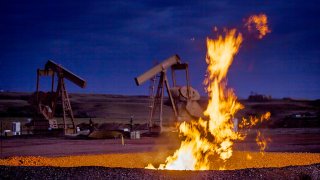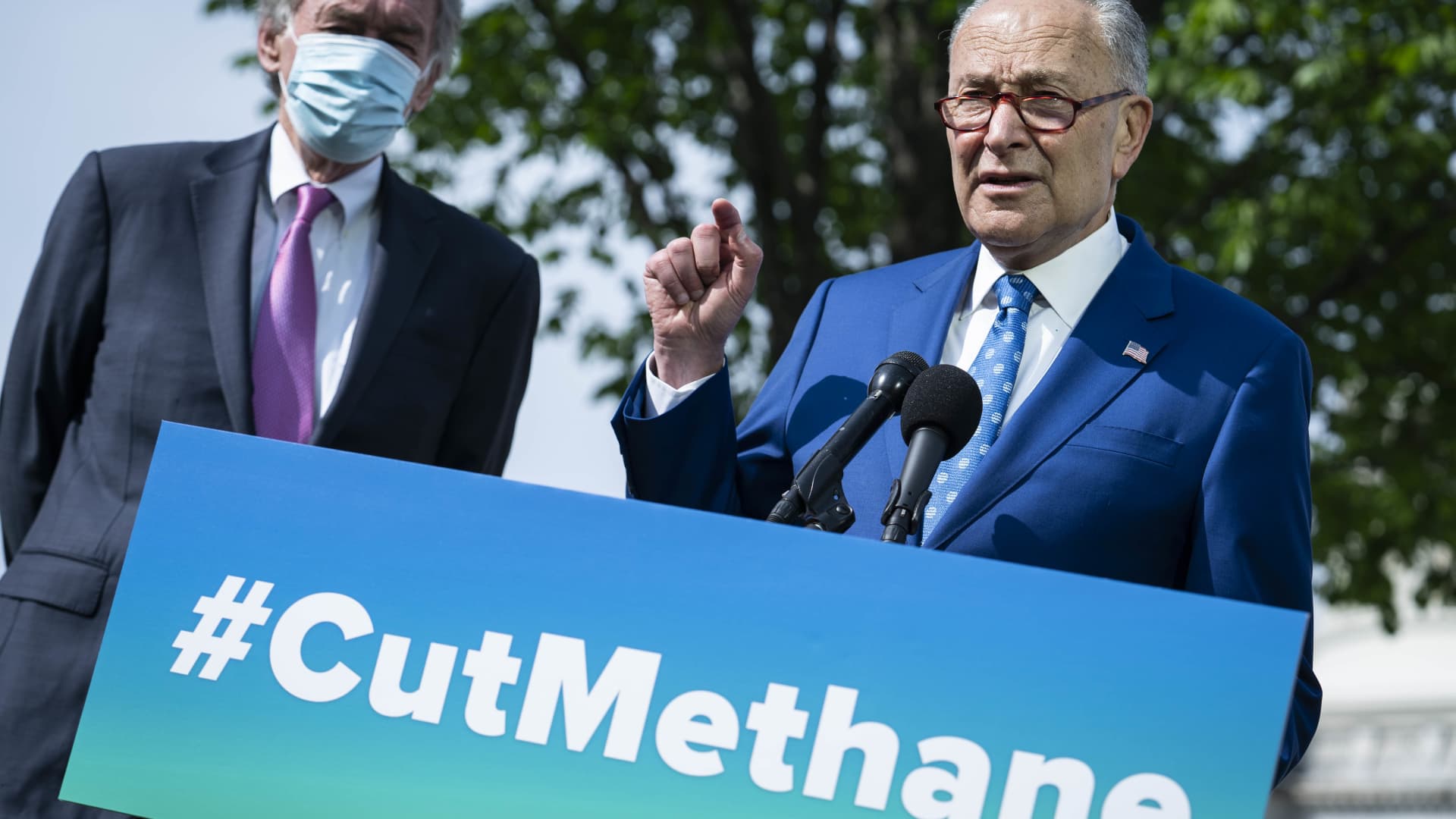
- The U.S. Senate on Wednesday voted to reverse former President Donald Trump's move to weaken Obama-era regulations designed to reduce climate-changing methane emissions from oil and gas fields.
- The 52-42 vote sets up the first official reinstatement of one of more than 100 climate regulations dismantled by the Trump administration.
- Regulating methane gas is critical for advancing President Joe Biden's goal to slash U.S. emissions in half from 2005 levels over the next decade and achieve a net-zero economy by 2050.

The U.S. Senate on Wednesday voted to reverse former President Donald Trump's move to weaken Obama-era regulations designed to reduce climate-changing methane emissions from oil and gas fields.
The 52-42 vote sets up the first official reinstatement of one of more than 100 climate regulations dismantled by the Trump administration. Regulating methane, a primary component of natural gas, is critical for advancing President Joe Biden's goal to slash U.S. greenhouse gas emissions in half from 2005 levels over the next decade and achieve a net-zero economy by 2050.
Get Boston local news, weather forecasts, lifestyle and entertainment stories to your inbox. Sign up for NBC Boston’s newsletters.
Democratic Senate Majority Leader Chuck Schumer, as well as Sens. Martin Heinrich, D-NM, Angus King, I-ME, and Edward Markey, D-Mass., introduced the resolution under the Congressional Review Act, a law which allows Congress to quickly overturn a previous administration's regulations with a simple majority vote and a signature from the president.
The Democratic-held House is expected to approve the measure and send it to President Joe Biden. The White House supports the passage of the bill, according to a statement on Tuesday from the Office of Management and Budget.
Passing the bill would reinstate the 2012 and 2016 Oil and Natural Gas New Source Performance Standards set by the Obama administration. The Trump administration's rollback last year eliminated federal requirements for oil and gas companies to monitor and repair methane leaks from pipelines, storage facilities and wells.
Money Report
In a briefing before the Senate vote, Schumer said the vote was one of the most important steps Congress can take to fight climate change. "This is a very big deal," Schumer said. "Methane is one of the most poisonous things we can put in our atmosphere."
Three Republican senators voted for the bill: Susan Collins of Maine, Lindsey Graham of South Carolina and Rob Portman of Ohio.
On his first day in office, Biden in an executive order directed the Environmental Protection Agency to reverse Trump's methane rollback and propose new regulations for industry producers.
Trump's effort to dismantle the rule was a victory for the oil and gas industry, which comprises nearly 30% of U.S. methane emissions. Smaller oil and gas companies and fossil fuel lobbyists who supported Trump's rollback have argued that methane regulations are too expensive.
Major oil and gas companies like BP, Shell and Exxon, who have promoted natural gas as a cleaner fuel than coal, have voiced support for methane regulation.
A spokesperson for the American Petroleum Institute, the oil and gas industry's largest trade group, said the group is working with the Biden administration "in support of the direct regulation of methane for new and existing sources through a new rulemaking process."
"We have an opportunity to build on the progress the industry has made in driving down methane emissions through technological advancement, and we are committed to finding common ground on cost-effective government policies," the spokesperson said.
The Senate vote was also welcomed by scientists and environmental groups who have long said that curbing methane emissions is vital is avoiding the worst impacts of climate change.
Methane is 84 times more potent than carbon dioxide and accounts for 10% of U.S. greenhouse gas emissions. Methane also doesn't last as long as carbon dioxide in the atmosphere, which makes it a good target for reducing global warming more quickly, in addition to efforts to slash carbon emissions.
"This vote reinforces President Biden's direction, in his Day One executive order, for EPA to set strong limits on the rampant methane leakage from both new and existing oil and gas operations across the country," said David Doniger, senior strategic director of the climate and clean energy program at the Natural Resources Defense Council.
Carbon dioxide and methane emissions hit record highs in 2020 despite worldwide lockdowns during the COVID-19 pandemic, according to research from the National Oceanic and Atmospheric Administration.
Such a sustained increase in emissions could heat up the atmosphere by 3 to 4 degrees Celsius by the end of the century, significantly higher than the Paris climate accord target to keep warming below 2 degrees.
A new study published in the journal Environmental Research Letters suggests that a push to cut methane emissions from the oil and gas industry, agriculture other human sources could slow global warming by as much as 30%.
"Today's bipartisan vote marks the beginning of the restoration of sensible methane policy at the federal level," said Dan Grossman, senior director of regulatory and legislative affairs at the Environmental Defense Fund.
"Oil and gas producers, environmental advocates and members of both parties agree that we need to get methane regulation back on track," Grossman said.






